Here’s your weekly dose of timeless ideas to sharpen your mind, make smarter decisions, and live better.
Quotes
I.
He who has learned to disagree without being disagreeable has discovered the most valuable secret of negotiation.
― Chris Voss
II.
The cost of a thing is the amount of what I will call life which is required to be exchanged for it, immediately or in the long run.
― Cal Newport
III.
People don’t buy what you do; they buy why you do it. And what you do simply proves what you believe.
― Simon Sinek
Ideas
I.
When scientists analyze people who appear to have tremendous self-control, it turns out those individuals aren’t all that different from those who are struggling. Instead, “disciplined” people are better at structuring their lives in a way that does not require heroic willpower and self-control. In other words, they spend less time in tempting situations.
James Clear in Atomic Habits: An Easy & Proven Way to Build Good Habits & Break Bad Ones
II.
Everything worthwhile in life is won through surmounting the associated negative experience. Any attempt to escape the negative, to avoid it or quash it or silence it, only backfires. The avoidance of suffering is a form of suffering. The avoidance of struggle is a struggle. The denial of failure is a failure. Hiding what is shameful is itself a form of shame.
Pain is an inextricable thread in the fabric of life, and to tear it out is not only impossible, but destructive: attempting to tear it out unravels everything else with it. To try to avoid pain is to give too many fucks about pain. In contrast, if you’re able to not give a fuck about the pain, you become unstoppable.
Mark Manson in The Subtle Art of Not Giving a F*ck: A Counterintuitive Approach to Living a Good Life
III.
The way of the Essentialist means living by design, not by default. Instead of making choices reactively, the Essentialist deliberately distinguishes the vital few from the trivial many, eliminates the nonessentials, and then removes obstacles so the essential things have clear, smooth passage. In other words, Essentialism is a disciplined, systematic approach for determining where our highest point of contribution lies, then making execution of those things almost effortless.
Greg McKeown in Essentialism: The Disciplined Pursuit of Less
Articles Worth Reading
I.
Does the Trolley Problem Have a Problem?
Daniel Engber | Slate
What if your answer to an absurd hypothetical question had no bearing on how you behaved in real life? Perhaps the trolley problems don’t even have to model any real-life situations whatsoever. They could provide insight into how people judge the way they ought to act, or the way they’d like to act, even if they would or could not act that way in practice.
II.
I have ‘pandemic brain’. Will I ever be able to concentrate again?
Kelli María Korducki | The Guardian
In the weeks and months after initial lockdown, people began to notice a sudden inability to focus, remember things and follow through on tasks. The pandemic hasn’t merely been a stressful event. It’s been a collection of many simultaneous stressors, some of them life-threatening, that have been compounded by disruptions in our physical activity, daily rhythms, and routines, and stretched out over many months. It will likely require patience – with ourselves and the people around us – while we reenter the social world. But we will get there. Our brains will, too.
III.
Time Management Won’t Save You
Dane Jensen | Harvard Business Review
The solution isn’t to become more efficient to accommodate more tasks, more decisions, and more distractions. The imperative is clear: simplify. Reduce the number of tasks you take on, replace decisions with principles, and put structure in place to eliminate distractions.
